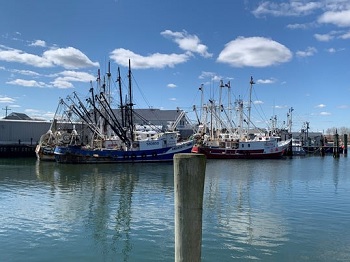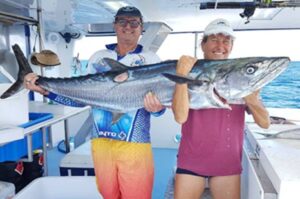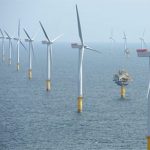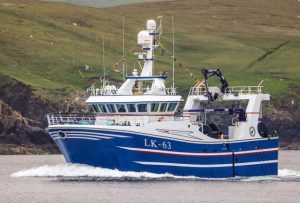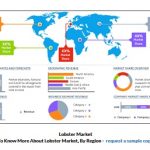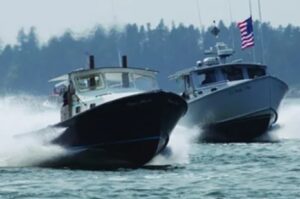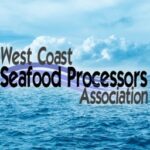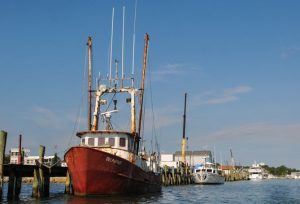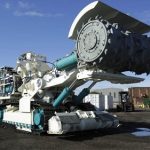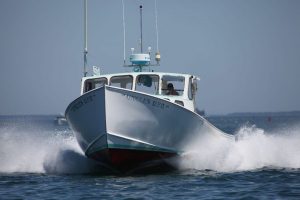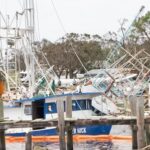Tag Archives: saving-seafood
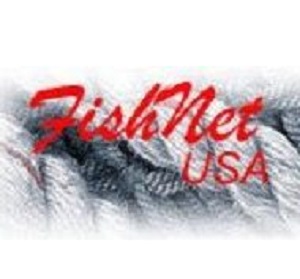
How Valuable Is FishNet-USA?
The question should actually be “how much is FishNet USA worth to you?” I’ve been writing stuff for the commercial fishing industry for over three decades. That’s a lot of words, and I suspect that no one who is on the present distribution list, who has read my columns in National Fishermen or on Saving Seafood, or has FishNet issues forwarded to them from someone on the list has not benefitted from some of them. Thanks to the Covid mess, and also thanks to what seemed to me to be some philosophical differences between me and some prior sponsors who were part of a commercial fishing consortium that was trying to get into the windmill business, my industry support has dwindled down to the point where the funds coming in just about cover my internet/telecommunications costs. Unlike just about all of our domestic fisheries, this is not sustainable. >click to read< By Nils Stolpe 16:26
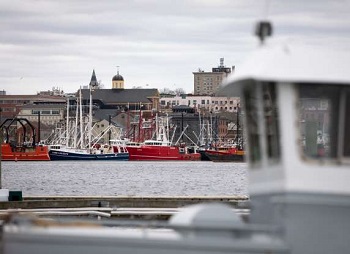
Commercial fishing industry in free fall as restaurants close, consumers hunker down and vessels tie up
The novel coronavirus pandemic has destroyed demand for seafood across a complicated U.S. supply chain, from luxury items such as lobster and crab, generally consumed at restaurants, to grocery staples sourced from the world’s fish farms. Now, with restaurants closed, many of the nation’s fisheries — across geography, species, gear types and management — have reported sales slumps as high as 95 percent. Boats from Honolulu to Buzzards Bay, Mass., are tied up dockside, with fisheries in the Atlantic, the Pacific, the Gulf of Mexico and Alaska affected, throwing thousands of fishermen out of work and devastating coastal communities. >click to read< 16:52

Coronavirus: Letter from 200+ US seafood industry stakeholders to Trump Administration
March 24, 2020, Dear President Trump. We write as participants in America’s seafood supply chain, a critical component of the country’s domestic food infrastructure and one of the major economic drivers in our country’s coastal communities and states. Empty restaurants, cafes, and dining halls are a visible reminder of the ongoing, unprecedented public health efforts to blunt the spread of COVID-19. The livelihoods of the chefs, cooks, servers, and other staff are obvious and direct casualties of those government efforts. The economic disruption caused by forced restaurant closures and active encouragement for Americans to “shelter in place,” however, extend far beyond the food service sector. >click to read< 19:37
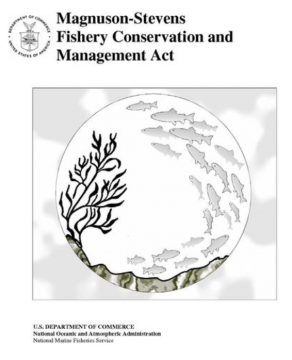
HR 200 – 24 Fishing Groups from Around the Nation Call for Magnuson-Stevens Act Reforms
Twenty-four members of Saving Seafood’s National Coalition for Fishing Communities (NCFC) are calling on Congress to enact broad reforms to the Magnuson-Stevens Act (MSA), including allowing for greater flexibility in how stocks are rebuilt and changes to how new management programs are implemented. The proposals, delivered in a letter to Alaska Senator Dan Sullivan, would, according to the signers, lead to a reauthorization that “allows for both sustainable fisheries management, and the long-term preservation of our nation’s fishing communities.” >click to read< 13:22 
New nationwide coalition seeking to unify commercial fishing interests
 A Washington, D.C.-based nonprofit group with strong New Bedford ties is creating a national coalition of commercial fishing interests to boost outreach and communication for the industry, which supporters claim often can be overmatched by unified environmental groups that promote competing interests. “We’re aiming to bring the entire supply chain of fishermen, shoreside businesses, processors, markets and restaurants together to join this effort to move the national conversation in a positive direction.” Read the rest here 08:43
A Washington, D.C.-based nonprofit group with strong New Bedford ties is creating a national coalition of commercial fishing interests to boost outreach and communication for the industry, which supporters claim often can be overmatched by unified environmental groups that promote competing interests. “We’re aiming to bring the entire supply chain of fishermen, shoreside businesses, processors, markets and restaurants together to join this effort to move the national conversation in a positive direction.” Read the rest here 08:43
Fishermen in the Northeast win a small victory
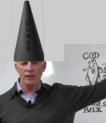 According to Climate Wire, an online publication of Environment and Energy Publishing LLC, New Bedford native son Bob Vanasse uncovered, through the use of Freedom of Information Act requests on behalf of Saving Seafood in Washington, D.C., a cluster of emails being circulated among several environmental groups hoping the president would be convinced to announce the New England monuments in Chile. The emails urged recipients to keep the plan a secret. “I hope no one is talking about Chile to the outside world,” an email from Conservation Law Foundation Interim President Peter Shelley said. Read the rest here 09:49
According to Climate Wire, an online publication of Environment and Energy Publishing LLC, New Bedford native son Bob Vanasse uncovered, through the use of Freedom of Information Act requests on behalf of Saving Seafood in Washington, D.C., a cluster of emails being circulated among several environmental groups hoping the president would be convinced to announce the New England monuments in Chile. The emails urged recipients to keep the plan a secret. “I hope no one is talking about Chile to the outside world,” an email from Conservation Law Foundation Interim President Peter Shelley said. Read the rest here 09:49
House Natural Resources Committee Demands Obama Administration Info on Marine Monument Designtions
 The U.S. House Natural Resources Committee has demanded records of all meetings, correspondence and memos related to marine monument designations. The letter references emails that “show representatives from the Conservation Law Foundation (CLF), the Natural Resources Defense Council, and the Pew Charitable Trusts warning their members to avoid talking to the ‘outside world’ about the organizations’ efforts to influence the Administration to announce a Marine National Monument off of New England during the ‘Our Ocean Conference’ in Chile.” The emails in question were originally obtained by Saving Seafood via public records requests, and were first reported by Greenwire. Read the rest here 17:00
The U.S. House Natural Resources Committee has demanded records of all meetings, correspondence and memos related to marine monument designations. The letter references emails that “show representatives from the Conservation Law Foundation (CLF), the Natural Resources Defense Council, and the Pew Charitable Trusts warning their members to avoid talking to the ‘outside world’ about the organizations’ efforts to influence the Administration to announce a Marine National Monument off of New England during the ‘Our Ocean Conference’ in Chile.” The emails in question were originally obtained by Saving Seafood via public records requests, and were first reported by Greenwire. Read the rest here 17:00
Oceana’s Bycatch Report and Media Coverage Ignores Key Successes in U.S. Fisheries
 Environmental special interest group Oceana made headlines last March with its bycatch report, “Wasted Catch: Unsolved Problems in U.S. Fisheries.” Since the report’s release, mainstream media publications and other environmental organizations, like the Pew Charitable Trusts, have further presented one-sided coverage of issues regarding bycatch in the United States — often providing little or no information about the significant and successful efforts taken by many commercial fisheries to curb unintended catch. These omissions of facts are misleading, ultimately providing the public a skewed perspective on U.S. fisheries management. Read more here 14:53
Environmental special interest group Oceana made headlines last March with its bycatch report, “Wasted Catch: Unsolved Problems in U.S. Fisheries.” Since the report’s release, mainstream media publications and other environmental organizations, like the Pew Charitable Trusts, have further presented one-sided coverage of issues regarding bycatch in the United States — often providing little or no information about the significant and successful efforts taken by many commercial fisheries to curb unintended catch. These omissions of facts are misleading, ultimately providing the public a skewed perspective on U.S. fisheries management. Read more here 14:53
Saving Seafood -“we find CLF’s characterization of our statement as a “flat-out falsehood”
WASHINGTON (Saving Seafood) — June 10, 2013 — The Conservation Law Foundation (CLF) recently criticized as a “flat-out falsehood” Saving Seafood’s description of the Lenfest Forage Fish Task Force’s report as lacking peer review. Subsequently, the Pew Charitable Trusts made the same argument in a letter to the editor of Seafood News. Saving Seafood would like to clarify our statement referencing the “unproven assumptions, as well as a lack of peer-review of the Lenfest Forage Fish Task Force.” continued here
The Saving Seafood Crew exposes the Myths of Blue Ocean Institute’s Elizabeth Brown
n her online article, “Reopening New England’s Closed Fishing Areas Would Be Bad For Mammals, Too,” the Blue Ocean Institute’s Elizabeth Brown echoes these claims, stating: “We need to fully evaluate these effects before any areas a re reopened.” But Framework 48 will not simply “open” these closures. The proposal only allows fishing sectors the ability to apply for access to these areas, after which, NOAA will weigh their requests against any possible environmental impacts. continued
re reopened.” But Framework 48 will not simply “open” these closures. The proposal only allows fishing sectors the ability to apply for access to these areas, after which, NOAA will weigh their requests against any possible environmental impacts. continued
Saving Seafood Responds to Eco Ocean Story, “Saving Seafood Offers Red Herring for Groundfish”
The following is an excerpt from the article “Saving Seafood Offers Red Herring for Groundfish,” originally published April 12 by Mike Misner on the blog Eco Ocean. Saving Seafood’s response to Mr. Misner’s article is below.
In favor of opening protected areas in New England, Saving Seafood has offered red herring. continued
CONSERVATION LAW FOUNDATION: Saving Seafood is “rather discomposed” Really?!!!
The Conservation Law Foundation’s Sean Cosgrove responds to our analysis of their criticism of NEFMC Council Member Laura Ramsden and their arguments on proposed changes to closed areas. 13 March 2013 “It is difficult to get a m an to understand something, when his salary depends on his not understanding it.” – Upton Sinclair continue
an to understand something, when his salary depends on his not understanding it.” – Upton Sinclair continue
Note Saving Seafood has been more than generous providing space for the ENGO agenda. They have always been accurate in their analysis, unlike the pampered poodles of the ENGO crowd. Sean Cosgrove should be absolutely ashamed of himself for quoting Upton Sinclair, especially if he understands the quote, and avoids looking in the mirror!
ANALYSIS: Why are fishermen angry about the new cod quotas if they can’t catch cod anyway?
 In the wake of Wednesday’s vote by the New England Fishery Management Council to slash cod catch rates by 77% in the Gulf of Maine and by 55% in Georges Bank,the question arose: “Why, if the fishermen can’t find fish anyway, do they care if the quota is cut?” Saving Seafood interviewed fishermen, industry members, and scientists to pose that question, and compiled their answers. The result follows: Read more
In the wake of Wednesday’s vote by the New England Fishery Management Council to slash cod catch rates by 77% in the Gulf of Maine and by 55% in Georges Bank,the question arose: “Why, if the fishermen can’t find fish anyway, do they care if the quota is cut?” Saving Seafood interviewed fishermen, industry members, and scientists to pose that question, and compiled their answers. The result follows: Read more






